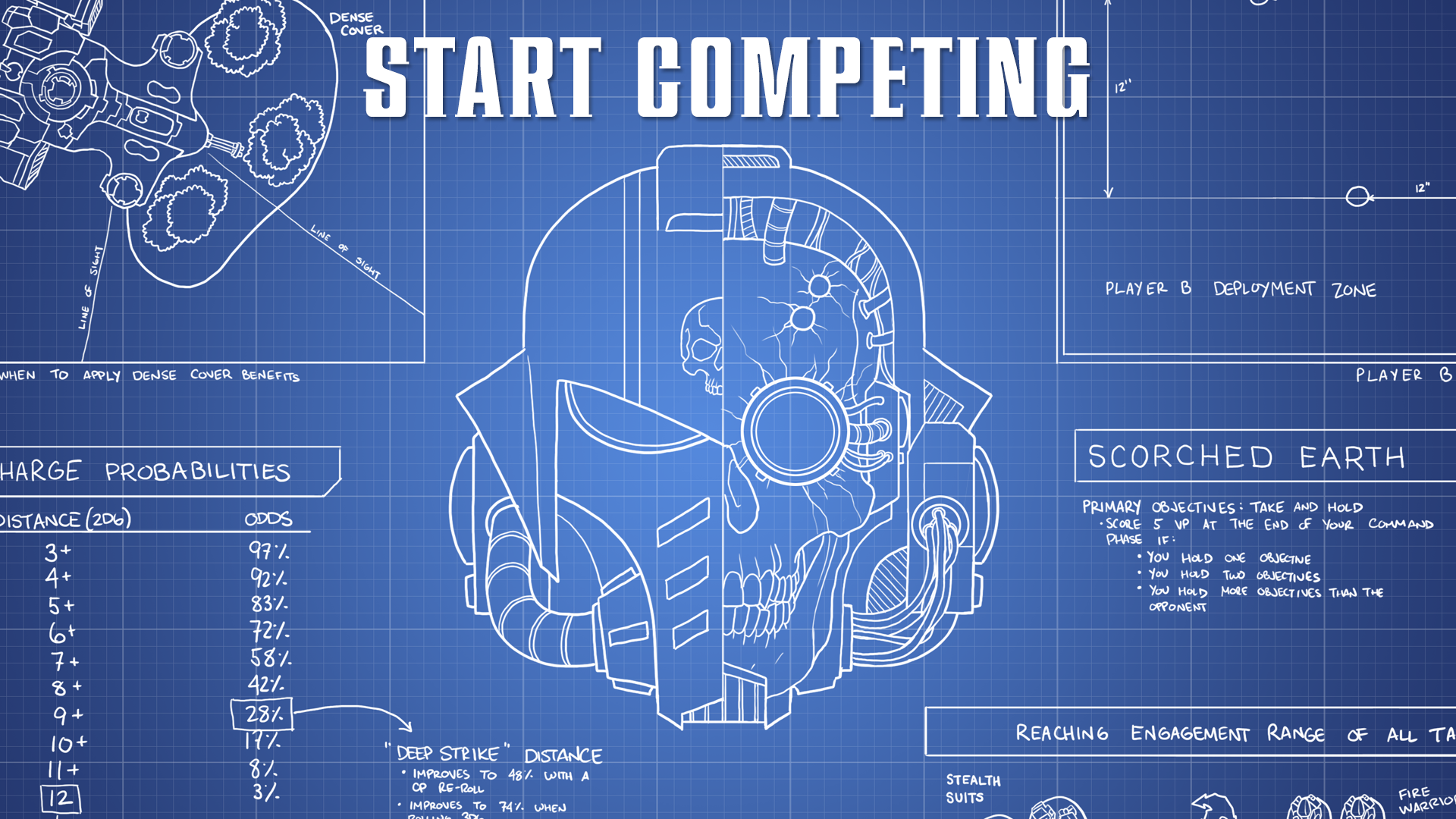Normally here at Goonhammer, you’ll read about (among other things) the latest and greatest competitive events, gaming news, or how to paint that fancy new model you picked up. Sometimes you come across excellent deeply personal writing that transcends the hobby into something else. With this article, I want to challenge you to find a way to do something good for others. As I write this during the holidays, I’m reminded that they are about giving to others, not what we receive ourselves.
What do I mean by doing good? Personal donations or volunteering are a great thing to do any time of year, sure. But consider if you could do more. What if you could somehow convince a bunch of people in an already expensive hobby to dig deep and donate fat stacks? Read on, and I’ll tell you all My Secrets to Charity Events I Absolutely Want You to Know.
Who the hell am I to be giving advice?
I started running charity miniature gaming events all the way back in 2012. Back then, I was still in my Warhammer 40k days. I was younger, and had a lot more energy and free time. I approached friend and fellow Goonhammer contributor muggins that fall and told him “hey we should run some kind of charity warhammer thing.” The rest, as they say, is history. Until late 2018, I ran numerous charity gaming events. We started out raising about $700 our first year, and by 2018 we were in the range of $1,200-1,300 per event, with only about 12-18 players.
I then had several years of hiatus when in retrospect I was deeply burnt out on tabletop gaming. In addition I needed to focus on ephemera like “my career” and “raising twins” among other things. This year, an off-hand comment from the owner of my LGS quickly ballooned into a full charity gaming event. With relatively little time to organize, we put together an event that raised over $1,400 from 17 players, all for the local chapter of Habitat for Humanity. Yes, there are much bigger and more successful charity events out there. The people doing those are amazing! But for a little local event with 1-3 organizers max, I think we’ve done pretty ok. So now the bug has bit me again, and I am already looking forward to next year’s charity event. But I thought to myself, “Self, what if you could spread the good word, and get other minis people supporting their local charities?” The Goonhammer powers that be gave me the blessing, and now here we are.
To be clear, I’m not arguing here that the methods I advocate for are the best way to run a charity event, or even an especially good way. But they’ve worked for me over the years. Additionally, whatever advice you take from here should be flavored by your own local customs, needs, etc. And finally, much of the advice I give here will seem obvious if you’re an experienced event or convention organizer. If so, kudos. This article is intended for those (like me in 2012) who have never run an event, but want to give it a go.
Choose your fighter(s)
Before you get into the weeds with writing rules or soliciting donations, make sure you’ve got some preliminary work done so all your work doesn’t go to waste. The first thing I recommend is recruiting some help organizing and running your event. These things can get complicated in a hurry. It can be a lot to shoulder on your own.
Remember that anyone helping with organizing should not be receiving any prizes beyond perhaps participation prizes. For example, at this year’s event, I recruited one local I knew was great at planning. Plus we were lucky in that the LGS owner was deeply involved in all aspects of planning and running. My co-organizer wound up playing against the bye each round so they still got a game, but he was not eligible for any raffle prizes.

Choose a charity
This will likely be a very personal decision in some ways. My advice is to find a local charity that you (and ideally anyone helping you) feel passionate about. You’ll work that much harder if it’s for something that’s important to you! Most of my past events have been to benefit a local food bank. Hunger, especially child hunger, has always been something I’m passionate about helping with.
The last event before my hiatus went to help pay down student lunch debts in a local school district. I’d learned about the pervasiveness of school lunch debt and lunch shaming that occurred in some schools. The Federal government let expire the pandemic-era policy for universal free school meals. Luckily, Michigan recently passed a law to make school breakfast and lunch free for every student, so lunch debt is a thing of the past in my state. Were it not, that would be my charity of choice. Instead, for this year’s event the LGS owner wanted the money to go to our local chapter of Habitat for Humanity. Their store was actually opened as part of a live+work program for revitalizing local neighborhoods. It’s easy to see why the owner was keen to support Habitat for Humanity, and I was pleased to do so.
If you don’t have a cause immediately in mind, talk to your local gaming community, search the news for local issues, or just internet search for local charities and nonprofits. I guarantee there will be no shortage. You technically don’t need to make it a local charity, but logistics may be easier with a local one. Additionally, your players will probably be more interested in helping a local organization. If possible, try to find an organization that is set up to take online donations. (More on why later.)
Once you have a crew and know which charity you want to benefit, it’s time to start thinking specifics.
TheChirurgeon: Be sure to vet the charity you’re going to be donating to. I find charity navigator to be a very helpful resource for understanding how good an org is at managing its funds and using donations. Their list of the best highly-rated charities is a good starting point if you’re passionate about a cause, but don’t have a particular charity in mind.
Choose your system
This sounds obvious, but you need to decide what game you’re going to feature in your event. This should be informed by your personal interests and expertise but also what is popular in your area. When doing something for charity you want as many possible attendees as you can get. That being said, I don’t recommend running multiple game systems at an event, at least at first. Keep things simple to start. You can build things up over time if you want. When first starting out, we tried to design an event that featured both 40k and Fantasy, but writing supplemental event rules (more on these later) for each was time-consuming, and there weren’t enough Fantasy players anyway.
Most recently, Marvel Crisis Protocol and Shatterpoint are my main (only, really) games, and MCP in particular is hot at my LGS. So that’s what we went with this year.
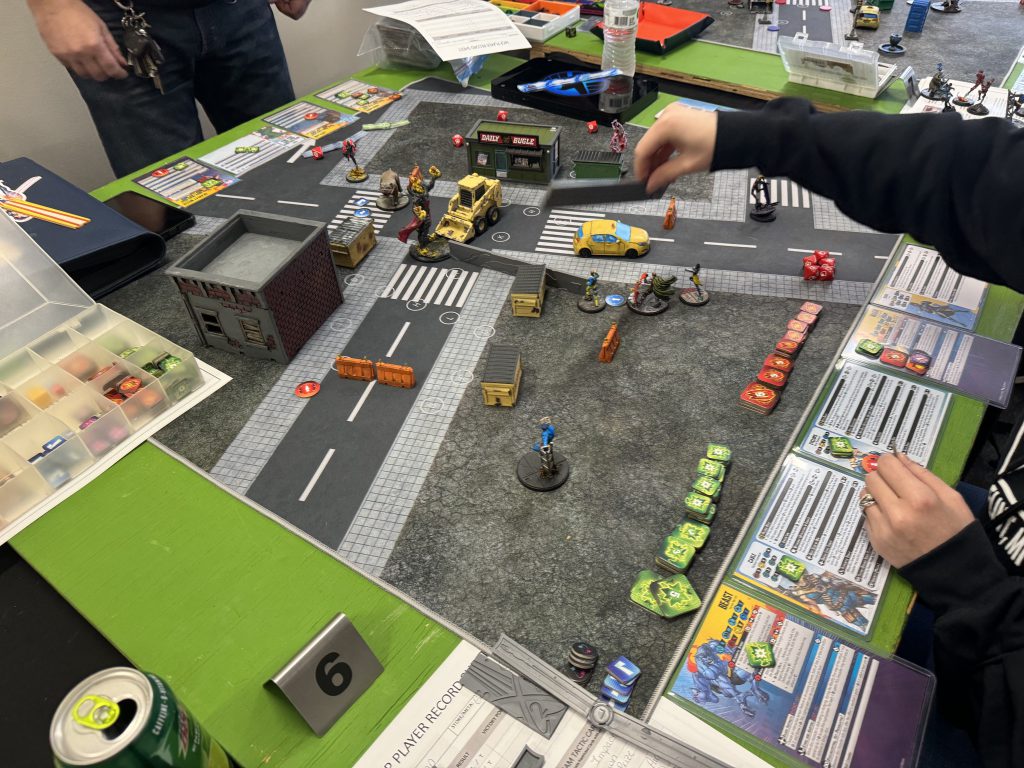
Choose your venue
Once you’ve settled on a game, confirm you have a store or other venue to host your event. We’ve always run our events through local game stores in the area, but you may be able to find an inexpensive or free venue such as a church recreation hall or campus meeting room. I’ve always preferred the LGS option, as it’s where local communities are used to playing. Also, store owners understand events (hopefully!) and may help advertise and with logistics. Just remember, a game store is making little to no money running tabletop events. Expect to do most of the work yourself, and if possible find ways to encourage players to support the store at the event.
Once you know the game system you’re running and the venue, you’ll know how many players you can accommodate and hopefully have an idea of what kind of event you want to run.
Writing rules
Sure, you can run a bog-standard, three-round Swiss-style tournament with standard rules, but this is for charity! The rules (and donations, see below) are where you’re going to hook your players. So spend some time on these, and create something exciting and silly for your players. Gamer brain means players love to find ways to break rules systems wide open. A well-crafted set of rules will let them do that, as long as they donate enough. The specifics will vary depending on the game system you’re running, and the style of event you want. But my general advice is to create a set of additional cheats that players can purchase either before the event, before each game, or in the middle of games. In my events, we track this by letting players donate to receive raffle tickets, with each cheat costing a set amount of tickets.
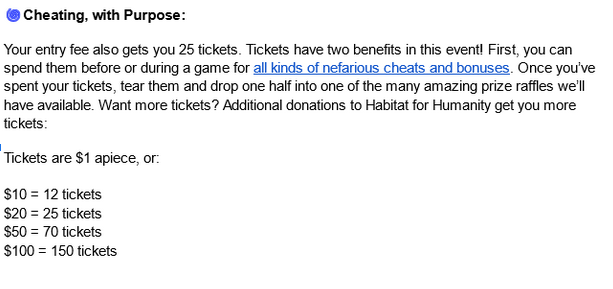
(Here’s our full cheat menu from this year’s Marvel: Crisis Protocol event.) When players use a cheat, they tear the tickets used to do so in half. One half goes into a raffle of their choice (see below).

I recommend having a variety of costs for rules. The larger the effect, the more expensive it should be. For example, in the MCP rules above, a player could spend 50 tickets to add an Infinity Gem to a model that normally couldn’t have one. This was especially powerful since it happened during roster creation and thus impacted all three rounds of games.
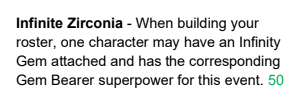
On the other hand, smaller effects such as re-rolling one or more dice should be similarly smaller in cost:

For re-roll style cheats, I can’t recommend enough limiting how often they can be used, or at least institute a compounding cost. Constant re-rolls will slow games down significantly. That also brings me to my next suggestions: I strongly encourage you to avoid any rules that will slow down a game. These are things like paying tickets to heal a model, add toughness, etc. Too many of that and your games will slow to a crawl. On the other hand, rules that speed things up such as allowing an additional attack? Go for it.
TheChirurgeon’s Note: If you’re worried about re-rolls slowing the game down too much, you can add an incentive such as “$10 lets you just turn a result into a 6,” which both works out for the charity on average and will create some quick alternatives to sitting there rolling the same die over and over until you get the inevitable result you’re paying for.
I also strongly encourage avoiding any rules that impact the other player’s models or dice. So no paying for debuffs, and certainly no re-rolling the opponent’s dice! This starts to get into bad feels territory, and the last thing you want at a charity event is people to have a bad time. I admit, in the salad days of charity Warmachine it was very funny to see players dropping an escalating number of tickets re-rolling opponent dice, then having their opponent pay to re-roll those re-rolls, back and forth. But stuff like that was slowing down play immensely, and just stopped being fun after a while.
Finally, let players cheat during Turn Zero. Take advantage of Gamer Brain. Let them pay to break list-building. Let them bring a model or models from another faction, extra tactics cards, etc. The details will vary based on the game system. List building is already just as fun to many players as is actually playing the game. Allowing them to completely break things here (with the appropriate donation of course), and Gamer Brain will help encourage more interest and donations. Here’s some examples from my most recent MCP event:

So in summary, I recommend writing rules that buff a player’s own models, allow limited re-rolls, and particularly anything that allows players to break rules for list building. And as you’re writing rules, make sure you’re also figuring out logistics for the event, including prize support.
Event logistics
Depending on your venue, you may have access to some amount of tables and terrain, or you may be starting from scratch. This is an area where you can and should rely on your local community to pitch in. Many players have personal gaming tables, mats, terrain, etc. Reach out to the community and explain what you need. In my experience, players are happy to pitch in. Doubly so for a charity event. With my main games these days, MCP and Shatterpoint, it’s commonly understood most stores won’t have much terrain for these games as it’s quite different from your standard 40k ruins or fantasy terrain. Players usually have quite a bit of their own and are used to bringing it to a store anyway. If you go this route, keep careful notes about who brought what. I recommend keeping a player’s terrain all on the same table if at all possible. We take pictures of everything as well just for additional record keeping. FInally, you might consider offering some free tickets to players who help out by bringing terrain as well.
Additionally, decide what kind of event you want to run. You can certainly do some kind of open gaming or narrative event, but if you’re taking my advice with the rules for cheats, you really want to do a tournament of some kind. Tapping into that competitive mindset is the other way a ‘pay to cheat’ event like this will take advantage of Gamer Brain.
I recommend limiting it to three rounds of Swiss-style regardless of how many players you have. If you have more than 8 players you’ll have to come up with tiebreakers of some kind (most competitive event rules and software have these already). If you don’t have a single undefeated person at the end of your event, no one will care. (If they do, troll them regularly and often, IMO.) A charity event should be a silly, broken, fun thing. It’s not meant to be some uber competitive brawlfest.
So what are your players gunning for then?
Make it rain prizes
Yes, you’re planning a charity event. It’s lovely when people donate out of the goodness of their heart. But why not sweeten the pot a little bit?
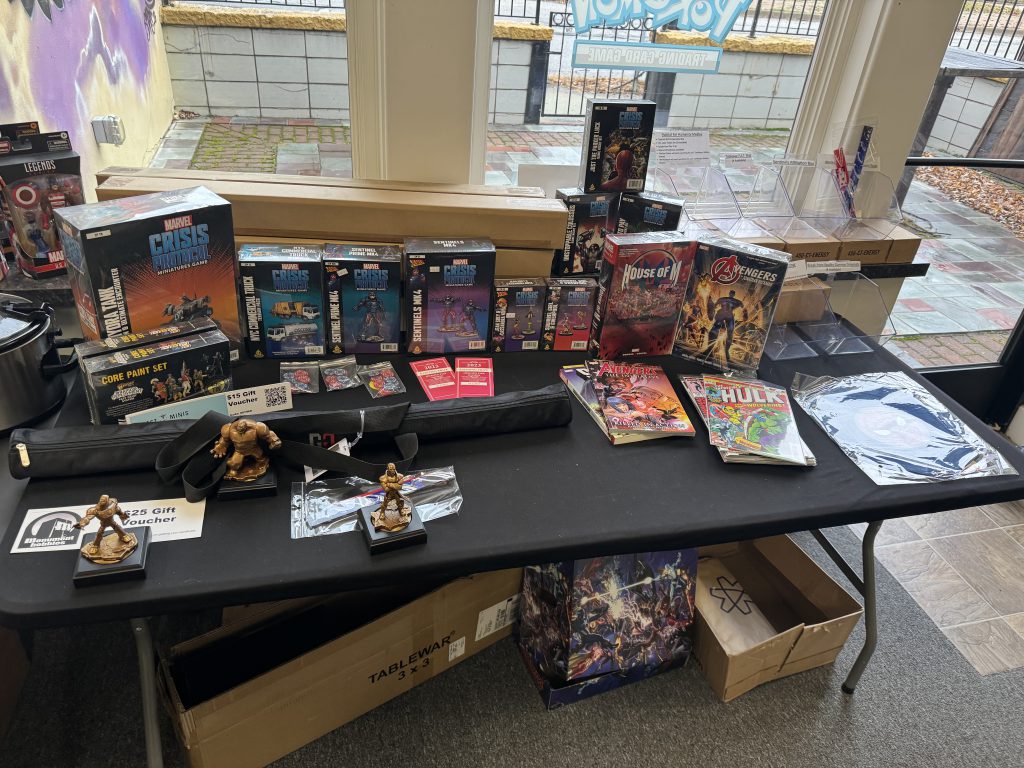
If you’ve made it this far, you know that I encourage a set of ‘pay to cheat’ rules. In my events, players donate to earn tickets. They then tear the tickets as they spend them for the various cheats. One half of the ticket then gets placed into one of several different raffles, loosely organized by theme. As you can see in the picture here, we secured a variety of prizes. How did we get it all? We asked every single online and in-person business we could think of that was even tangentially related and appropriate.
This is one of the most tedious and time-consuming parts of organizing, but also one of the most important. I created a template email in Google Docs and a Google Sheet for tracking donations. My co-organizers and I then found every business we could, then set about messaging and emailing. Some places never got back to us. Some weren’t able to help (small business ownership is tough!). Others wanted to, but were unable to fit us in their production schedule or budget. One thing you’ll learn is that companies get inundated with requests for free stuff. There’s mini events, charity or otherwise, all over the world constantly. And many of them are asking the people you’re asking. The best advice I can give you here is to ask as early as possible. Our recent event was put together in about two months. I’d recommend at least doubling that if possible. Companies will be more likely to help you with donations.
When you do make that ask, be professional and courteous. Donors want to know their products are going to actually go for a good cause, and are hoping for some kind of return. (They are a business at the end of the day.) So as part of your ask, explain clearly how their donation will be used, and how you will promote their company. For our events, we make table tents and posters advertising all of our donors.We also call them out regularly in our social media postings as well as on local gaming Discords.

Donors will often want to see evidence of your event, such as Facebook event pages or website listings. Have those included in your initial email if at all possible. Regardless of how they answer, remain positive and professional. It’s always possible they’ll be able to help you another time.
For those who do make a donation, keep in mind they may prefer to send their product care of your game store or venue rather than a personal address. This may be especially true if you don’t have an established relationship with them. It’s a good idea to offer this in your initial email as well, assuming your LGS is ok with it.
When you raffle your items at the end of the event, try to keep things moving and upbeat. People are probably tired and wanting to get going. We always ask players to put their initials on their raffle tickets, for example. This helps things move along much more quickly. If you have enough prize support, consider ways to make sure most or all attendees win something. That might be tricky if high-dollar donors have a ton of tickets in the pool, but in my experience players are pretty chill about these things and will happily cut themselves off from getting too many prizes. This amazing guy, for example, got $500 (no really) worth of tickets and could have won nearly every prize. He cut himself off after he got a few of the things he was gunning for. (Pro Tip: Time permitting, offer to help initial tickets for players, especially high-dollar donors. I put my son to work for this guy. Child labor ftw?)
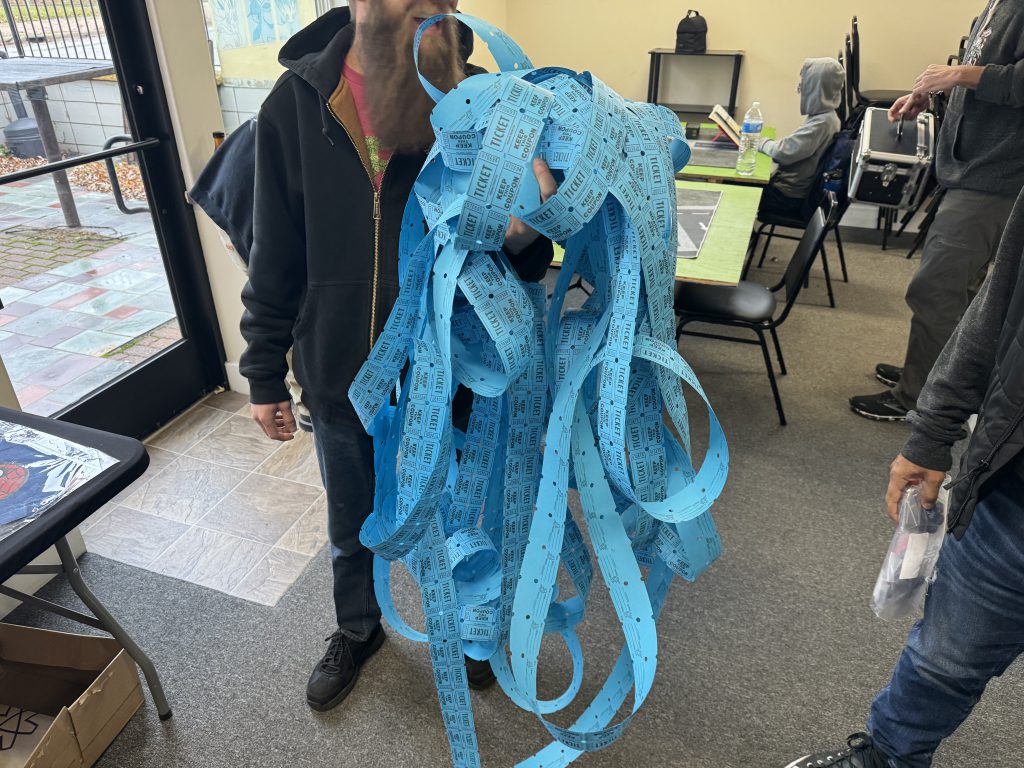
After your event, you’ll want to do some social media posts about how it went and what you raised. Try to call out your donors one more time there. Additionally, send a follow up email thanking them. I like to tell them how much we raised, and include some pictures from the event. That makes the whole thing a little more real and personal.
Still not sure who you can ask for donations or what to ask for? Here’s some places to consider:
The company that produces the rules and/or models for your game: Exclusive swag is a great get here. In our last event, Atomic Mass Games sent con-exclusive stickers and measurement tool sets as well as some models. We used one tool set as a prize for 1st place, and the other was available via raffle, along with the models. Stickers were a prize for all attendees. Keep in mind larger companies can be harder and/or slower to work with. Sometimes it helps to have an in, or know someone who does. In my case, a Goonhammer editor put in a good word with AMG and got us a contact on the inside. If you don’t have that in, be persistent and keep trying!
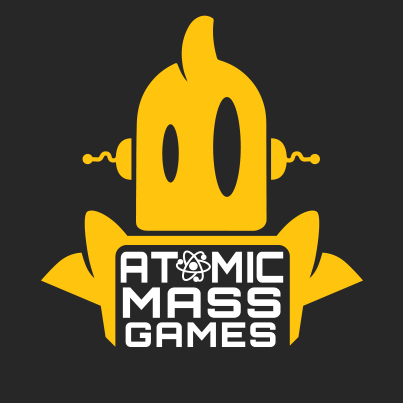
Hobby companies: Companies that produce paint or other hobby supplies. We got enough here to have a whole category for hobby related prizes. Gift certificates are often the way to go here for players to pick up exactly what they need. If you have the design skills, try to create something professional looking for the winner to receive.
Accessory and terrain makers: There’s a whole cottage industry out there for companies and individuals making third party accessories for gaming. These can be a great source as companies want to increase their visibility in gaming communities. Marvel: Crisis Protocol is generally played on terrain mats, and we had a ton of success with companies providing these. We almost had enough to give every player a mat, in fact. A company may be willing to work with you to create custom objectives, measurement tools, or dice. We were able to secure custom acrylic activated tokens from a local convention (The Michigan GT) who always provides custom acrylic accessories for their events for example.
Third party model producers: There’s also all kinds of third party models available out there. Depending on the game system, you may want to exercise caution here. Some companies may prefer you not advertise or include third party products that directly infringe on their products. Atomic Mass Games for example, has to protect their Marvel license very carefully. We made sure to not offer any kind of infringing products as prize support. One donor did have that kind of thing available, but also had a number of terrain products. So we emphasized only those in our social media posts, etc. If your game system of choice is model-agnostic, ignore all this and go nuts!
Retailers: My default advice is to not solicit from game retailers whether they are local or online. Since you’re probably hosting your event in a local game store, you should be encouraging players to buy from them. Donations from other sources may not be welcome from the game store hosting. Again, small business ownership is tough.
Local businesses: My advice is more broad here as what’s available is dependent on where you live and game. In my experience, it’s tougher to get donations from local businesses that are not hobby-related, but not impossible. A local comic store provided some appropriate products at our recent event, given the Marvel theme. Maybe there’s a nearby food joint players already frequent. They might be willing to provide some gift cards, or even some food for the event. Is there a local hobby store (without too much overlap with your venue’s products)? It’s worth a shot. Incidentally, if you’re hosted by a LGS, they’re already giving a lot by letting you take over a large portion of their store. If they want to donate prizes, wonderful. But don’t assume or ask in my opinion.
Local players: Everyone has a pile/shelf/drawer of shame. (If you don’t, I just don’t understand you as a person.) Consider asking locals to donate new or gently used models, etc., as prizes. In years past, we’ve had players donate whole Warmachine and Hordes armies. This year, one player donated a whole table’s worth of painted terrain. I myself cleared out some models I was realistically never going to get to. So one player got to walk away with all the models needed to run the Sentinels affiliation. You’d be surprised what you can get from players just by asking!
Have any locals who are skilled painters? Ask if they’ll commit to painting one or more models for winners, and add them as prizes in raffles. These can be quite popular prizes as well.
Finally, consider hooking up any local player donors with some tickets to say thank you.
Player payment
So it’s event time. You’ve got tables full of beautiful terrain, and all kinds of prizes to give away, raffle, or to be won via games. But how do you go about processing donations? First of all, I’m going to discourage you from taking donations of goods if possible. While certainly appreciated, you don’t necessarily want to be responsible for schlepping hundreds of cans and boxes of food at the end of a long day, for example. More importantly, charities can stretch their dollars far more than individuals. So if at all possible, shoot for monetary donations.
Cash and checks should be figured out ahead of time. Checks are easy enough- simply have them write it out to the charity. If you’re at a LGS, will the store handle the cash and checks, or do they prefer you handle it? If you’re handling it yourself, get a good lockbox and keep it on or near you or another organizer at all times. After the event, turn in the donation and get a receipt. I hope no one ever accuses anyone of wrongdoing with donations, but a receipt can protect you if so.
Cards or electronic donations are their own challenge. I would encourage you to not process card donations through an LGS, for example. Otherwise they are getting hit with fees at an event they’re probably losing money for already. In the past, I’ve had a Square card reader and processed cards that way through my personal accounts. But that has potential for its own problems including fees, and is not ideal. What we’ve instead settled on is having players donate directly to the organization of choice, then show us the emailed receipt. Most charities will have a way to donate electronically, so provide a way for players to access that ahead of time and at the event. In the donor image above, you’ll see the QR code we used, for example. Ultimately, it’s about maximizing the donation amount to your charity and minimizing costs to your LGS (or you).
Other considerations
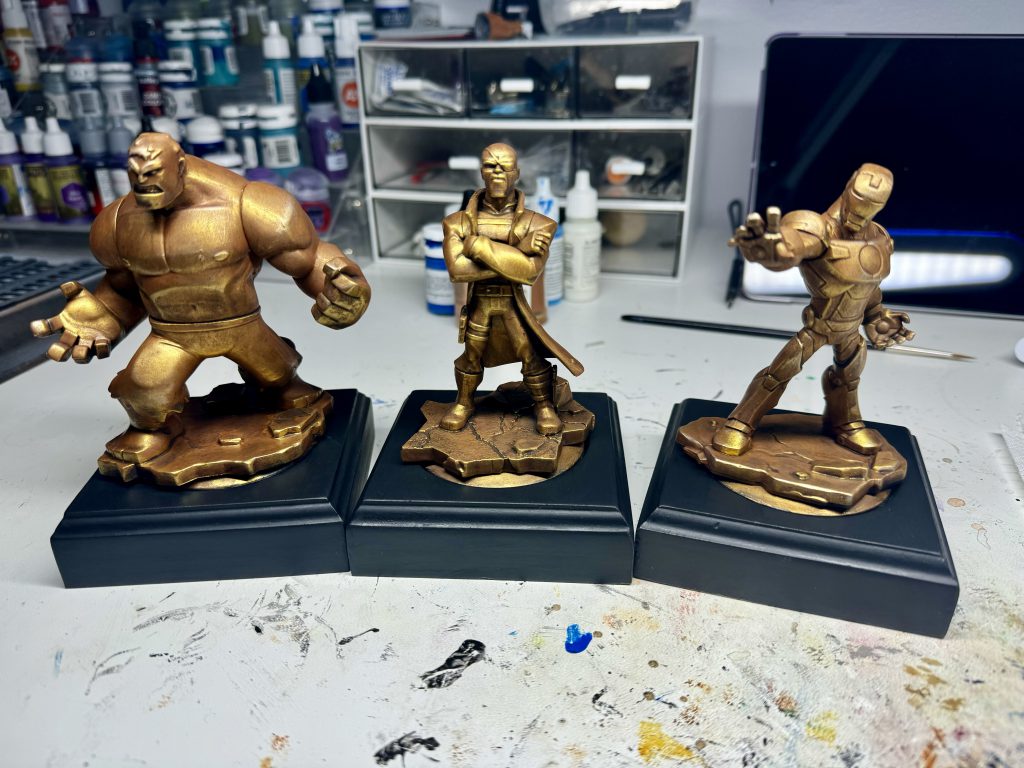
If you’ve followed my advice, you’ve put together a fun, silly, and broken event. So I don’t recommend having a ton of prizes based on overall record. Instead, consider encouraging things like hobby and (of course) donations. For example, our last prize package involved a trophy for Best Overall (Nick Fury), Best Craftsman (Iron Man), and Biggest Donor (Hulk). Each trophy winner also got a high value prize of some kind, as well. Everything else was raffled or given away as a participation prize.
Trophies are a good place to get creative. As you can see above, I got some old Disney Infinity figures and painted them gold. The bases were some kind of stair rail caps I found at Home Depot, that just happened to fit the figures perfectly. Bonus, these can be used as in-game terrain for MCP.
In the past with my food related events, I typically did a custom can label on a food can of some kind, topped with a model:
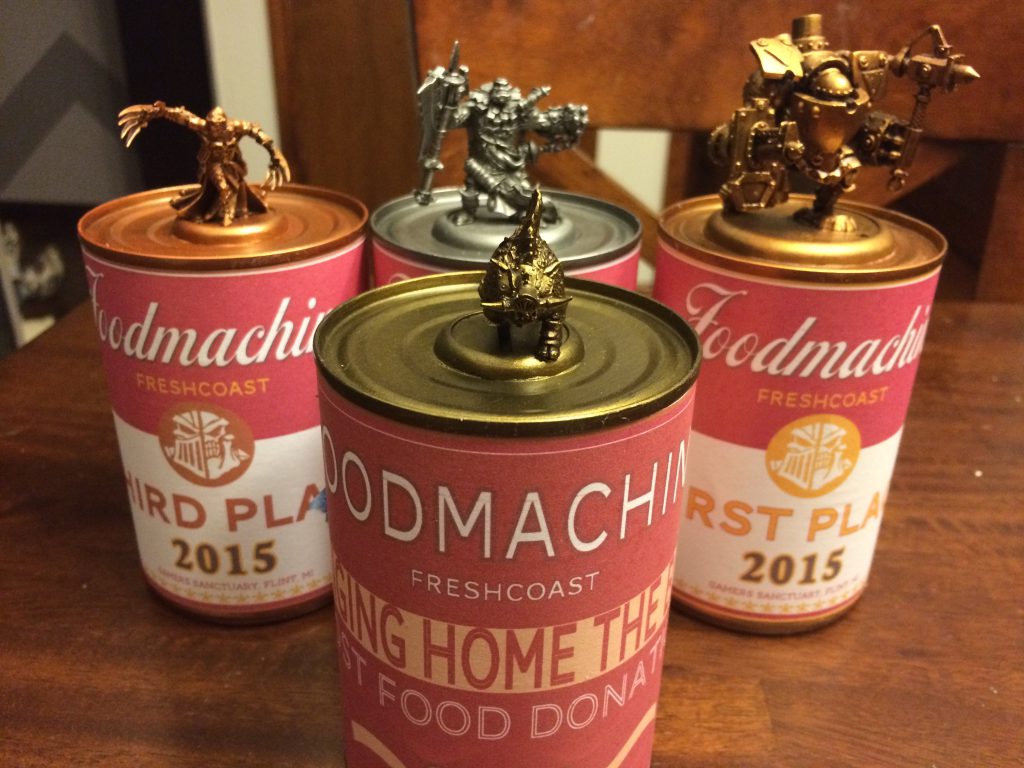
(Yes, I did not follow my own advice about prizes for placing. We learn through experience.)
Whatever you do trophy wise, keep it simple. This is definitely a ‘thought that counts’ situation, so you need not get too elaborate. Even those simple can trophies were coveted by locals back then.
Finally, consider feeding your players. Everyone appreciates free food. Providing some kind of lunch is a great way to show appreciation to your players. Again, keep things simple here. Maybe you convince a local restaurant to provide free or discounted food. Pizza is always a winner, too. Early on, I established a tradition with my events of making pulled pork as well as bringing macaroni salad made by my partner. We typically provide hot dogs as well as they’re quick and easy to grill on site or boil and transport. The mac salad is now famous with locals, and players would be legitimately bummed if I didn’t bring it at this point. Of course clear all this with your venue, especially if they sell food themselves. I specifically do not provide anything like chips/snacks or drinks at my events. That encourages players to purchase from the LGS venue instead.
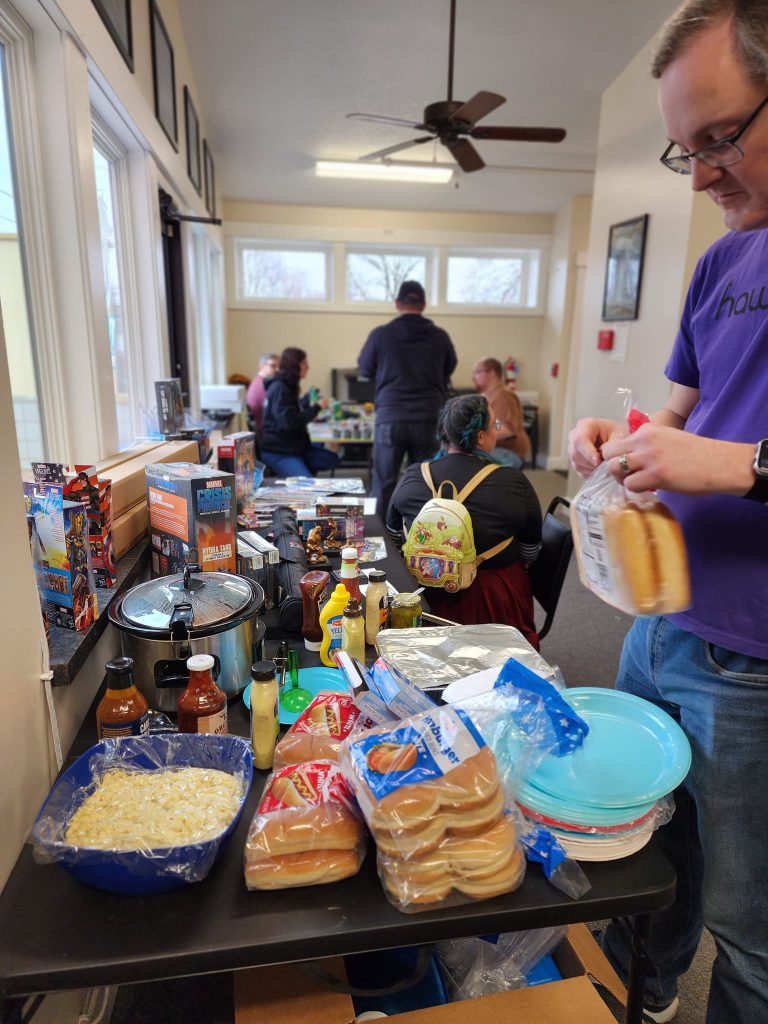
If you provide food, remember to set aside space for it, and don’t forget things like condiments, plates, napkins, and utensils. You don’t want to be scrambling in the middle of your event because you don’t have any forks.
Concluding remarks
If you’ve made it to the end of this article, thank you. While reading about event planning and logistics isn’t the most exciting, I hope the advice here will encourage you to go out and plan your own charity event. I promise it will be exciting and fulfilling to give back.
Have questions about planning an event like this? Reach out in the comments or via the Goonhammer Discord server. I’m happy to help!
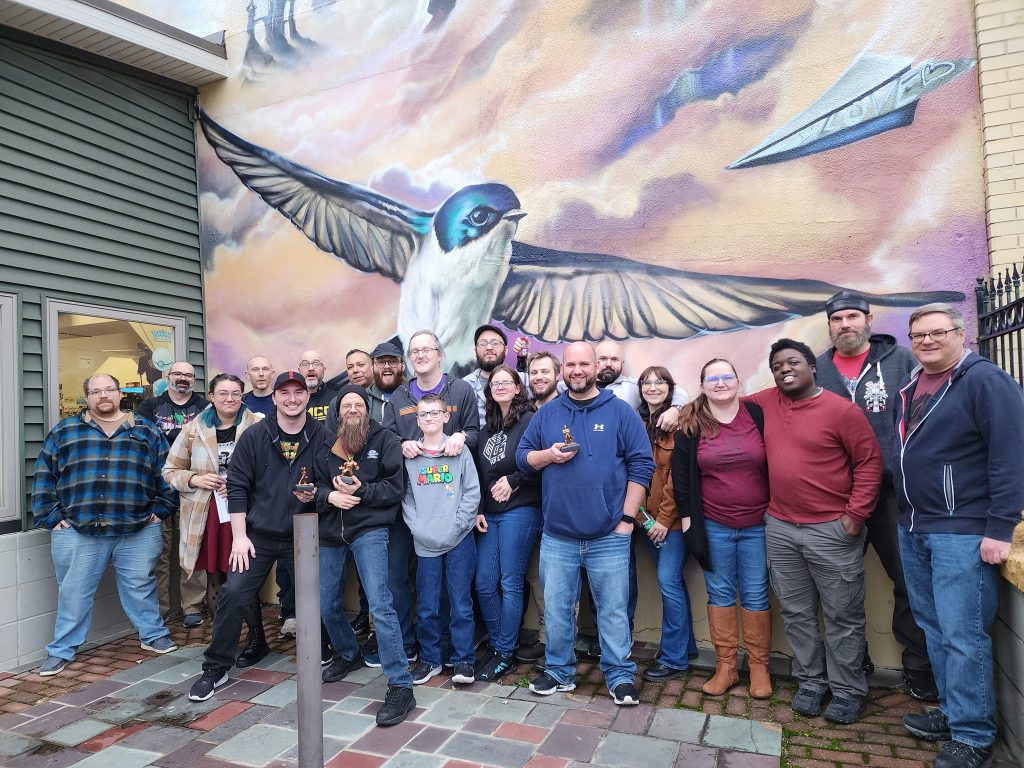
Have any questions or feedback? Drop us a note in the comments below or email us at contact@goonhammer.com.
